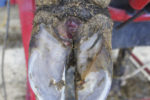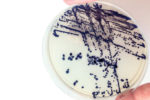Articles Tagged with ''bacteria''
One of the most important considerations come weaning time is making sure calves’ gut health is up to the task of maintaining their immune systems.
Read More
Finding value in problem situations
Proper diagnostics will define the challenges and ensure correct solutions are implemented to reduce risk and recover value from disease situations.
Read More
Tackling the challenges of calf scours and coccidiosis
Every year, calf scours and coccidiosis negatively impact bottom lines. These pathogens and parasites assault young immune systems, but careful long-term planning, targeted management practices and solid treatment protocols can limit their influences.
Read More
Mycoplasma bovis: Answers to common questions and tips for treating it
Mycoplasma bovis can be a highly detrimental disease affecting a large number of calves, especially when commingled. Treating calves with chlorine dioxide can be highly effective.
Read More
Fat mobilization: Connecting metabolic and infectious diseases in transition cows
Reducing the inflammatory response in fat tissues will limit lipolysis intensity and limit the risk for developing clinical ketosis and other inflammatory diseases.
Read More
Digital dermatitis or 'hairy heel wart' is not just a dairy issue
For many feedyards, digital dermatitis is rapidly becoming the most common cause of lameness. Understanding its causes, as well as prevention and early treatment protocols, can help gain control over this infectious hoof issue.
Read More
Good bacteria: The answer to clostridium
How can producers help cattle survive and thrive against opportunistic pathogens? When bacterial pathogens like clostridium are the issue, proper utilization of good bacteria can be a powerful answer.
Read More
Histophilosis-caused issues in feedlot cattle
H. somni can be difficult to detect and treat and can cause a variety of clinical syndromes in feedlot cattle including pneumonia, thrombotic meningoencephalitis (TME), reproductive disease, joint infections and more.
Read More
Control Clostridium perfringens type A bacteria levels in calves
Clostridium perfringens type A (CpA), if allowed to overgrow because of excess starch or carbohydrates in the ration, can result in sudden death.
Read More








